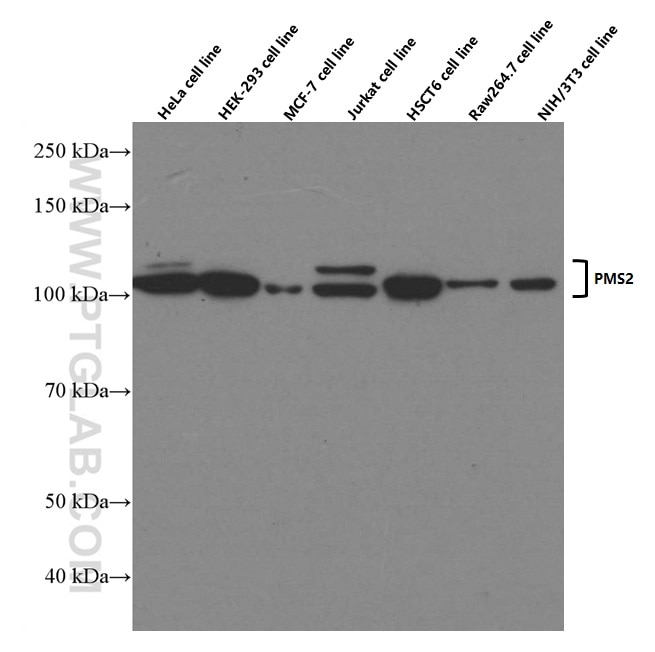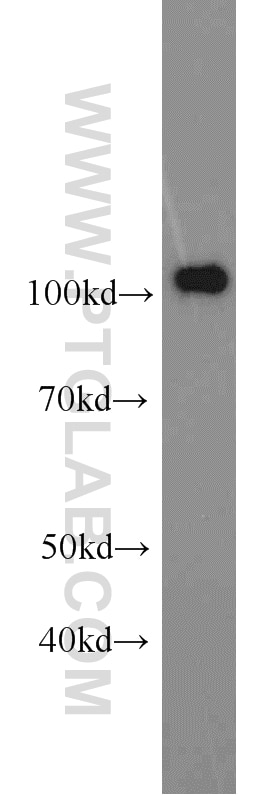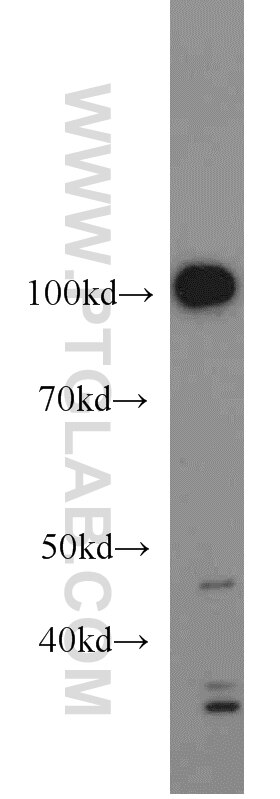Anticorps Monoclonal anti-PMS2
PMS2 Monoclonal Antibody for WB, ELISA
Hôte / Isotype
Mouse / IgG2a
Réactivité testée
Humain, rat, souris et plus (1)
Applications
WB, IHC, ELISA
Conjugaison
Non conjugué
CloneNo.
1G4E6
N° de cat : 66075-1-Ig
Synonymes
Galerie de données de validation
Applications testées
| Résultats positifs en WB | cellules A431, cellules HeLa |
Dilution recommandée
| Application | Dilution |
|---|---|
| Western Blot (WB) | WB : 1:500-1:2000 |
| It is recommended that this reagent should be titrated in each testing system to obtain optimal results. | |
| Sample-dependent, check data in validation data gallery | |
Applications publiées
| WB | See 2 publications below |
| IHC | See 7 publications below |
Informations sur le produit
66075-1-Ig cible PMS2 dans les applications de WB, IHC, ELISA et montre une réactivité avec des échantillons Humain, rat, souris
| Réactivité | Humain, rat, souris |
| Réactivité citée | canin, Humain, souris |
| Hôte / Isotype | Mouse / IgG2a |
| Clonalité | Monoclonal |
| Type | Anticorps |
| Immunogène | PMS2 Protéine recombinante Ag12661 |
| Nom complet | PMS2 postmeiotic segregation increased 2 (S. cerevisiae) |
| Masse moléculaire calculée | 862 aa, 96 kDa |
| Poids moléculaire observé | 100 kDa |
| Numéro d’acquisition GenBank | BC093921 |
| Symbole du gène | PMS2 |
| Identification du gène (NCBI) | 5395 |
| Conjugaison | Non conjugué |
| Forme | Liquide |
| Méthode de purification | Purification par protéine A |
| Tampon de stockage | PBS avec azoture de sodium à 0,02 % et glycérol à 50 % pH 7,3 |
| Conditions de stockage | Stocker à -20°C. Stable pendant un an après l'expédition. L'aliquotage n'est pas nécessaire pour le stockage à -20oC Les 20ul contiennent 0,1% de BSA. |
Informations générales
PMS2, also named as PMSL2, belongs to the DNA mismatch repair mutL/hexB family. It is a component of the post-replicative DNA mismatch repair system (MMR). It heterodimerizes with MLH1 to form MutL alpha. MulL alpha (MLH1-PMS2) interacts physically with the clamp loader subunits of DNA polymerase III, suggesting that it may play a role to recruit the DNA polymerase III to the site of the MMR. It also implicated in DNA damage signaling, a process which induces cell cycle arrest and can lead to apoptosis in case of major DNA damages. (PMID: 16873062, PMID: 18206974) Defects in PMS2 are the cause of hereditary non-polyposis colorectal cancer type 4 (HNPCC4). Defects in PMS2 are a cause of mismatch repair cancer syndrome (MMRCS).
Protocole
| Product Specific Protocols | |
|---|---|
| WB protocol for PMS2 antibody 66075-1-Ig | Download protocol |
| Standard Protocols | |
|---|---|
| Click here to view our Standard Protocols |
Publications
| Species | Application | Title |
|---|---|---|
Cancer Immunol Res Remodeling Chondroitin-6-Sulfate-Mediated Immune Exclusion Enhances Anti-PD-1 Response in Colorectal Cancer with Microsatellite Stability. | ||
Front Oncol Molecular Classification in Patients With Endometrial Cancer After Fertility-Preserving Treatment: Application of ProMisE Classifier and Combination of Prognostic Evidence. | ||
Sci Rep Mismatch repair proteins play a role in ATR activation upon temozolomide treatment in MGMT-methylated glioblastoma. | ||
Surgery Mismatch repair status as a beneficial predictor of fluorouracil-based adjuvant chemotherapy for pancreatic cancer. | ||
J Surg Oncol Clinicopathological and survival characteristic of mismatch repair status in ovarian clear cell carcinoma. | ||
Mol Genet Genomic Med PMS2 germline mutation c.943C>T (p.Arg315*)-induced Lynch syndrome-associated ovarian cancer. |
Avis
The reviews below have been submitted by verified Proteintech customers who received an incentive forproviding their feedback.
FH Daniela (Verified Customer) (03-17-2022) | Bands in WB and IF staining were both aspecific.
 |




